Mothers of newborns in Bajura, Humla, and Mugu endure hardships by staying in cowsheds as part of their age-old tradition despite the government’s slogan of ‘regular check-up’, ‘secured motherhood’, and ‘nutritious food’. A report by Mina Sharma for CIJ, after her field-reporting from these districts.
Mina Sharma: Centre for Investigative Journalism-Nepal
Nandasara Sarki, 23, Bajura, Baandhu
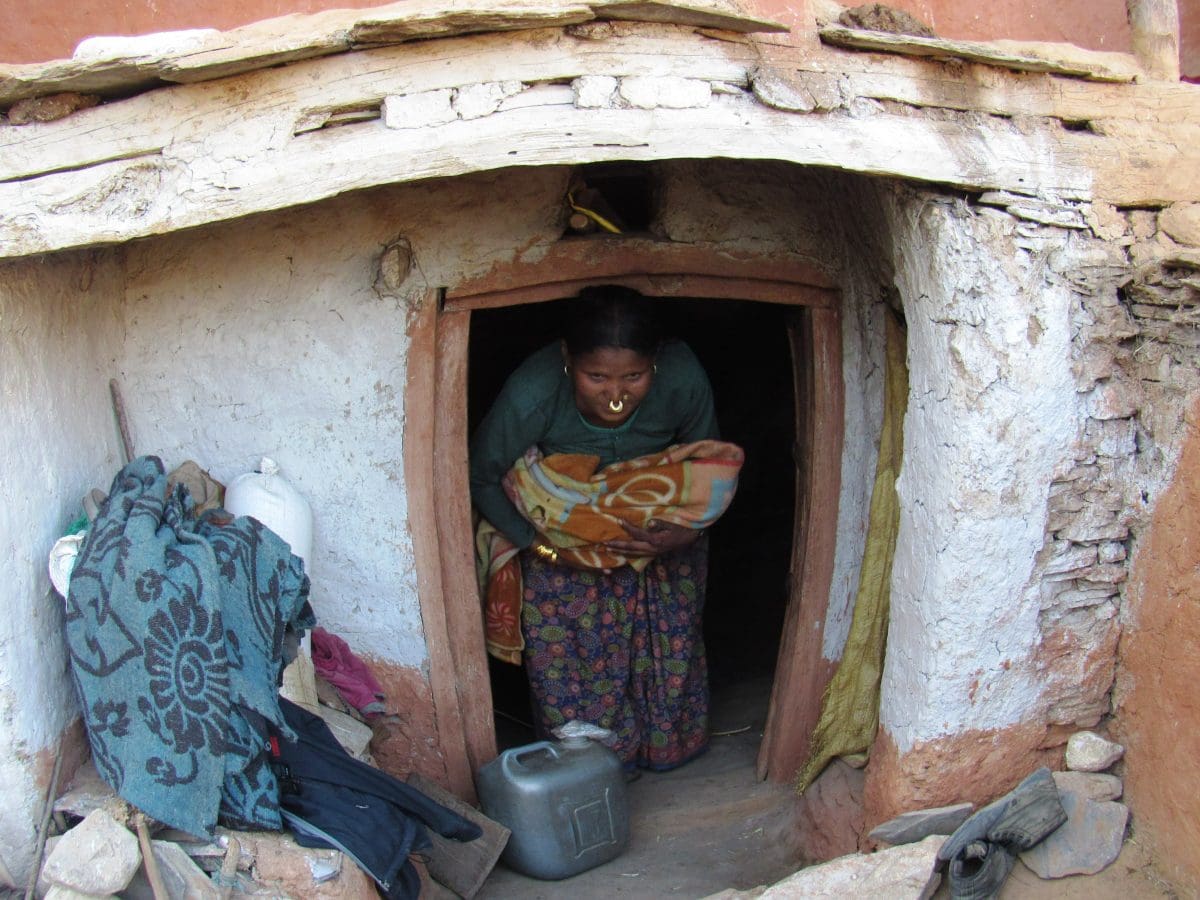 Kartik, 11, 2073. I have been staying in this shed ever since I delivered my baby 12 days ago because no one can touch us during menstruation and post-natal period. Staying in a shed has been our tradition, which most of the women here adhere to. My parent’s home is in Humla where woman is sheltered in sheds during menstruation and delivery. This is my fifth baby and every time I have stayed in a cowshed for a month. Family members provide food for only 10 days after delivery. From the eleventh day, I prepare my own food.
Kartik, 11, 2073. I have been staying in this shed ever since I delivered my baby 12 days ago because no one can touch us during menstruation and post-natal period. Staying in a shed has been our tradition, which most of the women here adhere to. My parent’s home is in Humla where woman is sheltered in sheds during menstruation and delivery. This is my fifth baby and every time I have stayed in a cowshed for a month. Family members provide food for only 10 days after delivery. From the eleventh day, I prepare my own food.
Two of my babies died due to cold. It’s not that all new-born babies will survive. This is not only my case. This baby, too, is suffering from a cough and diarrhea. Therefore, I am sitting under the sun for warmth. The room becomes extremely cold when we do not light the fire.
Health workers often suggest us to refrain from staying in cowsheds during this period. But we do. If we stay in our homes, God will be angry and lead to disasters in our families, such as famine, drought, and other diseases. Even the babies who have survived will face consequences. I was also born in a shed and stayed there for a month. Look at me, am I not fit and fine? Therefore, there is nothing wrong in staying in sheds during this period. We should not make Gods angry for our wellbeing.
‘Sir’ and ‘Madam’ (health workers) insist us to refrain from staying in sheds. But we are absolutely fine here since we have been getting food regularly from our family members, who are nearby. Even during my next pregnancy, I will stay in a shed. I cannot go against the tradition that will lead to misfortune in my family. Is there anything wrong to tread in the footsteps of our elders, or follow the tradition? I have daughters only. I have to give birth to a son to look after the property. In fact, we cannot have a son if we do sin.
Saraswati Budathapa, 21, Bajura Rugin
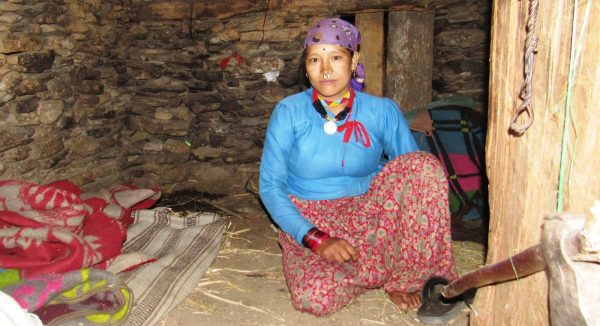 12 Kartik. I delivered my baby 12 days ago. I spent 24 hours at a health post after giving birth to this baby. Following the doctor’s recommendation, we came home and ever since I have been staying in the shed. Staying in a cowshed after delivery has been a tradition in our village. We cannot make our Gods angry by entering the house or kitchen. Health workers suggest us not to stay in the shed and to maintain cleanliness but that is against our tradition. How could we break our tradition, which our mother and grandmother adhered to? When they are still safe and sound, I don’t think anything will happen to me either.
12 Kartik. I delivered my baby 12 days ago. I spent 24 hours at a health post after giving birth to this baby. Following the doctor’s recommendation, we came home and ever since I have been staying in the shed. Staying in a cowshed after delivery has been a tradition in our village. We cannot make our Gods angry by entering the house or kitchen. Health workers suggest us not to stay in the shed and to maintain cleanliness but that is against our tradition. How could we break our tradition, which our mother and grandmother adhered to? When they are still safe and sound, I don’t think anything will happen to me either.
Can you imagine the consequences if I entered the kitchen? If deities will be angry, there will be famine and drought. Besides, our children will be disabled. How could we do this when we are aware of these consequences?
In fact, we hang an axe at the door and keep a sickle in our waist to keep away ghosts and other evils. Besides the mother and her baby, nobody will stay in the shed for a month. This is our belief and culture. In fact, we cannot follow health workers’ suggestions.
Magi Chadara, 17, Mugu, Hyanglu
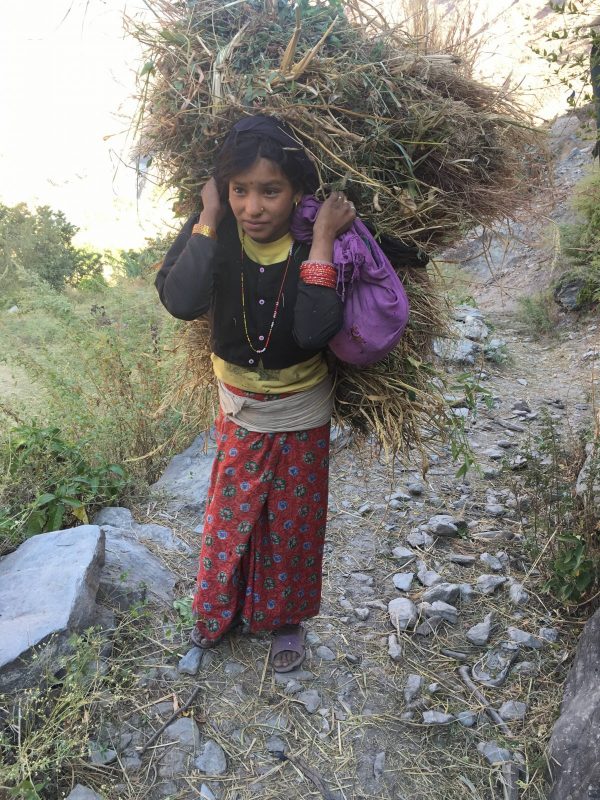 14 Kartik. My daughter is 13 days old and she is sleeping in the cowshed. I am out to cut grass for cattle. Now, after feeding the buffalo, I will eat some food, breastfeed my daughter and then come back to the field to cut grass. The health post is just a five-minute walk from here. But if I go there, they (health workers) will ask us not to stay in the shed during this period. Besides, they will call me for a regular health check-up. Therefore, I preferred to give birth in my home.
14 Kartik. My daughter is 13 days old and she is sleeping in the cowshed. I am out to cut grass for cattle. Now, after feeding the buffalo, I will eat some food, breastfeed my daughter and then come back to the field to cut grass. The health post is just a five-minute walk from here. But if I go there, they (health workers) will ask us not to stay in the shed during this period. Besides, they will call me for a regular health check-up. Therefore, I preferred to give birth in my home.
Health workers advise us not to stay in the cowshed during this period. But how could we break the age-old tradition? I rushed to the shed and gave birth to my daughter there. When my elders, including my mother, mother-in-law, sister-in-law and neighbors, gave birth to their children inside the shed why not I? Has anything happened to them? I eloped with my boyfriend at the age of 15. But, you know, life is not the same now. I have to toil hard for a living even during menstruation when we are not allowed to work indoors. Therefore, I am here to harvest paddy. Males do not touch us during menstruation. I will stay in the shed when I give birth to my second baby. How can I displease Gods by entering the kitchen? Tradition has to be followed even if I am literate. Don’t you follow your tradition? God will be angry if you touch Him during menstruation. Why do people suggest us not to stay in the cowshed? How could we stay together with family members and elders in this period? Therefore, we cannot go against the practice.
Chinkala Chadara, 22, Mugu, Hyanglu
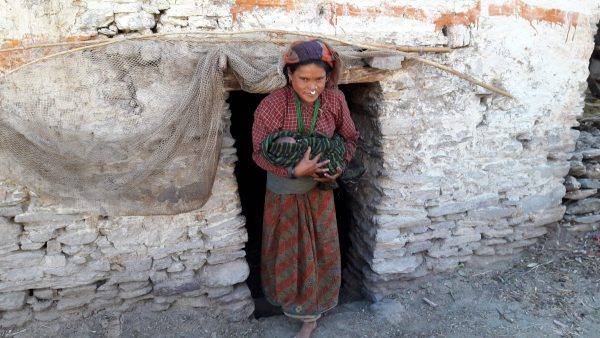 14 Kartik. I have been staying in this shed ever since I delivered my baby six days ago here. In fact, when I went to the health post during pregnancy, doctors advised me to deliver the baby at the health post. However, I gave birth to my baby in the cowshed without any complications. I was even offered some money if I delivered my baby in the health post as part of our culture. One of my neighbors, who recently delivered a baby, is also staying in a cowshed. It is our tradition to prepare food ourselves. Since nobody is allowed to touch us during menstruation, we work in the fields, wash clothes, among other chores. I find no problem in staying inside a cowshed since during this period both mother and baby are grubby. God will bestow his blessings if we please Him. If God becomes angry, there will be a crisis at home and family, especially to the male members, children will be disabled, among other problems. Staying in a cowshed for 30 days can avert untoward incidences. Therefore, what’s wrong with staying here?
14 Kartik. I have been staying in this shed ever since I delivered my baby six days ago here. In fact, when I went to the health post during pregnancy, doctors advised me to deliver the baby at the health post. However, I gave birth to my baby in the cowshed without any complications. I was even offered some money if I delivered my baby in the health post as part of our culture. One of my neighbors, who recently delivered a baby, is also staying in a cowshed. It is our tradition to prepare food ourselves. Since nobody is allowed to touch us during menstruation, we work in the fields, wash clothes, among other chores. I find no problem in staying inside a cowshed since during this period both mother and baby are grubby. God will bestow his blessings if we please Him. If God becomes angry, there will be a crisis at home and family, especially to the male members, children will be disabled, among other problems. Staying in a cowshed for 30 days can avert untoward incidences. Therefore, what’s wrong with staying here?
Dudhari Dhami, 24, Humla, Maila
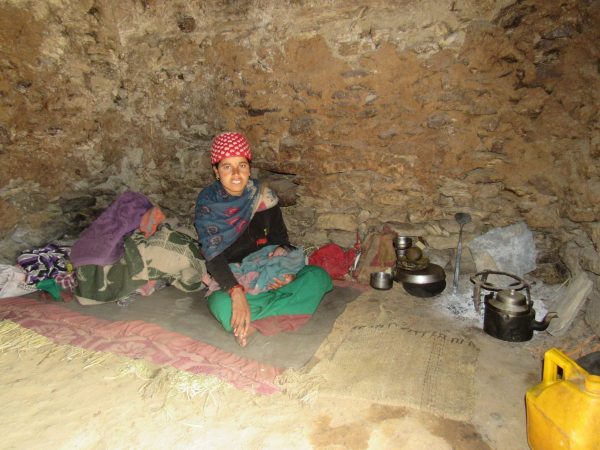 I stayed in a cowshed for a month after delivering a baby in 2072. One of my neighbors rushed me to the shed as soon as I felt pain. She cut the umbilical cord of my baby with a sickle. Even as I gave birth to two children in a cowshed, I am fit and fine. Even I was born in a cowshed. Therefore, it is wise to give birth in a shed rather than inside the house to avoid unfortunate circumstances. My mother says we have to abide by this age-old tradition. In fact, we should not drink milk during this period, and if we do so, cows or buffaloes will stop giving milk. Forget about health, tradition is important. The only problem is that insects enter the cowsheds during raining season.
I stayed in a cowshed for a month after delivering a baby in 2072. One of my neighbors rushed me to the shed as soon as I felt pain. She cut the umbilical cord of my baby with a sickle. Even as I gave birth to two children in a cowshed, I am fit and fine. Even I was born in a cowshed. Therefore, it is wise to give birth in a shed rather than inside the house to avoid unfortunate circumstances. My mother says we have to abide by this age-old tradition. In fact, we should not drink milk during this period, and if we do so, cows or buffaloes will stop giving milk. Forget about health, tradition is important. The only problem is that insects enter the cowsheds during raining season.
Bhawana Buda, 22, Humla, Maila
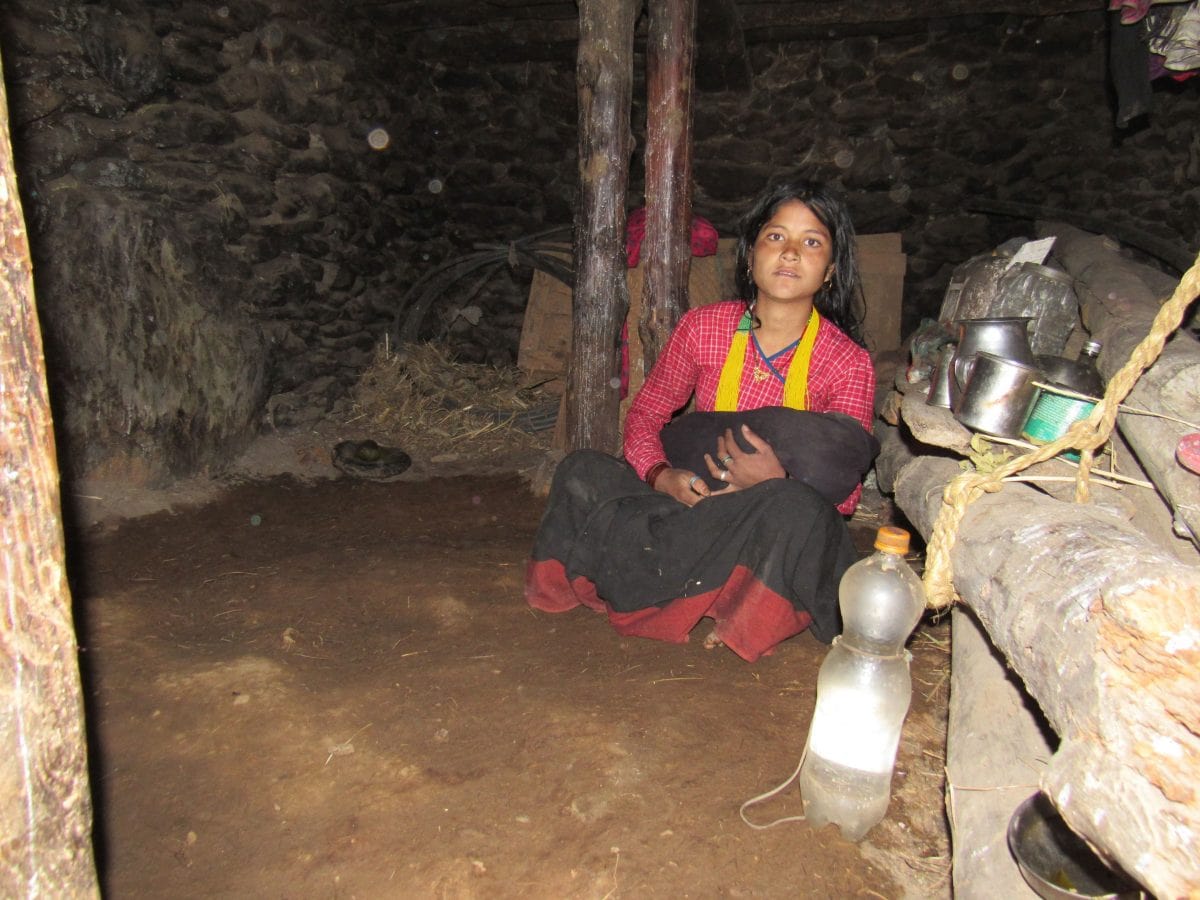 I stayed inside a cowshed after delivering three babies in 2072. Health posts are just an alternative in case of complications. Besides, since the health post is far away from here, we cannot go there by leaving domestic chores. Feeding green leaves or liquid can cause diarrhea to the babies. Hence, we need to be cautious while feeding a baby. We should prepare food ourselves. My mother says flouting the rules will make God unhappy. Therefore, we stay in cowsheds to avoid unfortunate circumstances.
I stayed inside a cowshed after delivering three babies in 2072. Health posts are just an alternative in case of complications. Besides, since the health post is far away from here, we cannot go there by leaving domestic chores. Feeding green leaves or liquid can cause diarrhea to the babies. Hence, we need to be cautious while feeding a baby. We should prepare food ourselves. My mother says flouting the rules will make God unhappy. Therefore, we stay in cowsheds to avoid unfortunate circumstances.
Ramudevi Malla, Bajura, Baandh
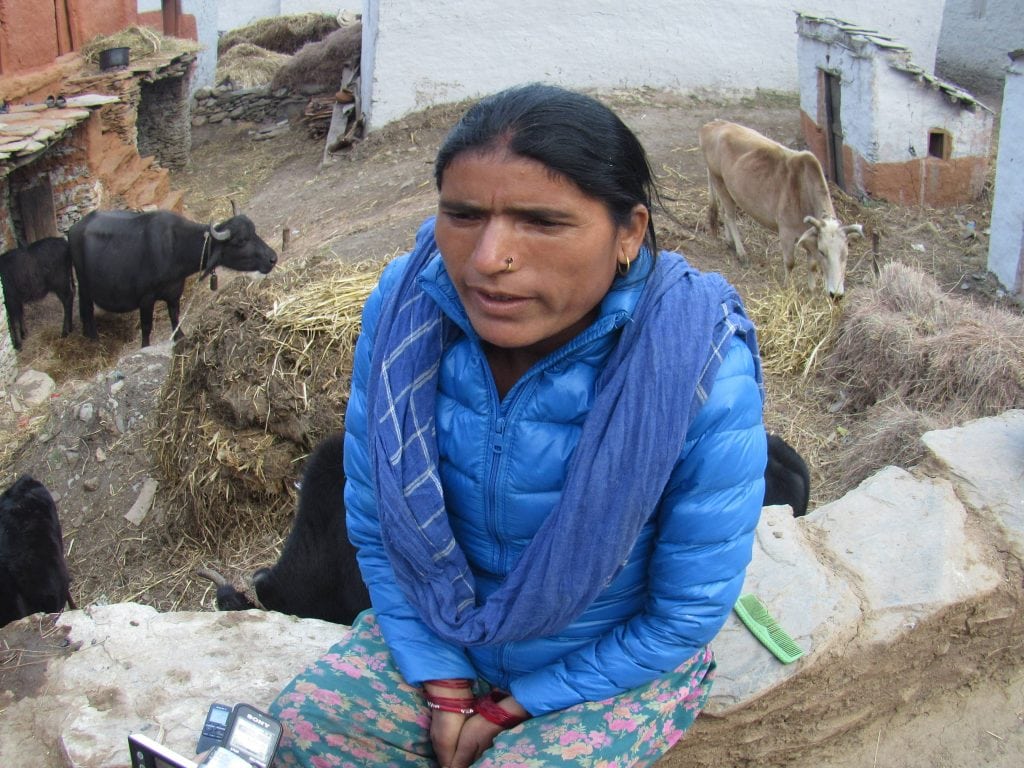 I have been working as a health worker for the last ten years. I have failed to convince people here that giving birth to a baby inside a cowshed will lead to complications. We have succeeded in making people aware of pregnancy tests, vitamins, de-worm, and iron tablets but have not been able to convince about cowsheds. There is a belief that God will be displeased if they stay in their homes during this period. An awareness campaign should be initiated to end this practice.
I have been working as a health worker for the last ten years. I have failed to convince people here that giving birth to a baby inside a cowshed will lead to complications. We have succeeded in making people aware of pregnancy tests, vitamins, de-worm, and iron tablets but have not been able to convince about cowsheds. There is a belief that God will be displeased if they stay in their homes during this period. An awareness campaign should be initiated to end this practice.
In fact, we could not even convince them in a group. Kolti is far away and has no access to television or radio. Women are rushed to the cowshed as soon as labor pain starts even if health workers are nearby. They don’t even heed our words.
I delivered my baby inside my home just to convince them that no evil is going to happen, however, to no avail. I even asked them to keep the mother and baby in a separate clean room, and not in kitchen or praying room. Only one to three percent keeps mother and bay in their homes. Majority of the people here have superstitious belief.
In fact, getting rid of these beliefs is not an easy task. Daughters-in-law cannot break this tradition. They still have trust in their mothers-in-law and elders who claim to have been hale and hearty despite staying in cowsheds after delivering even 10 babies. Elderly women do not want youngsters to go to health centers. Therefore, young women, too, cannot challenge the tradition.
Earlier, there was no practice of cleaning the cowshed. However, these days, they place some hay on the floor after cleaning the shed. Most of the sheds are filthy. Forget about listening to us about cleanliness, hygiene, and diet, they will instead prefer to argue with us. Last year, a mother died of excessive bleeding due to infection on the way to the health post. Even if we tell them that staying in a cowshed will invite complications such as pneumonia, diarrhea, and other diseases, they will rather wittily respond saying, “We don’t want to displease God.”
Dhan Bahadur Fadera, Acting Chief, Rugin Health Post
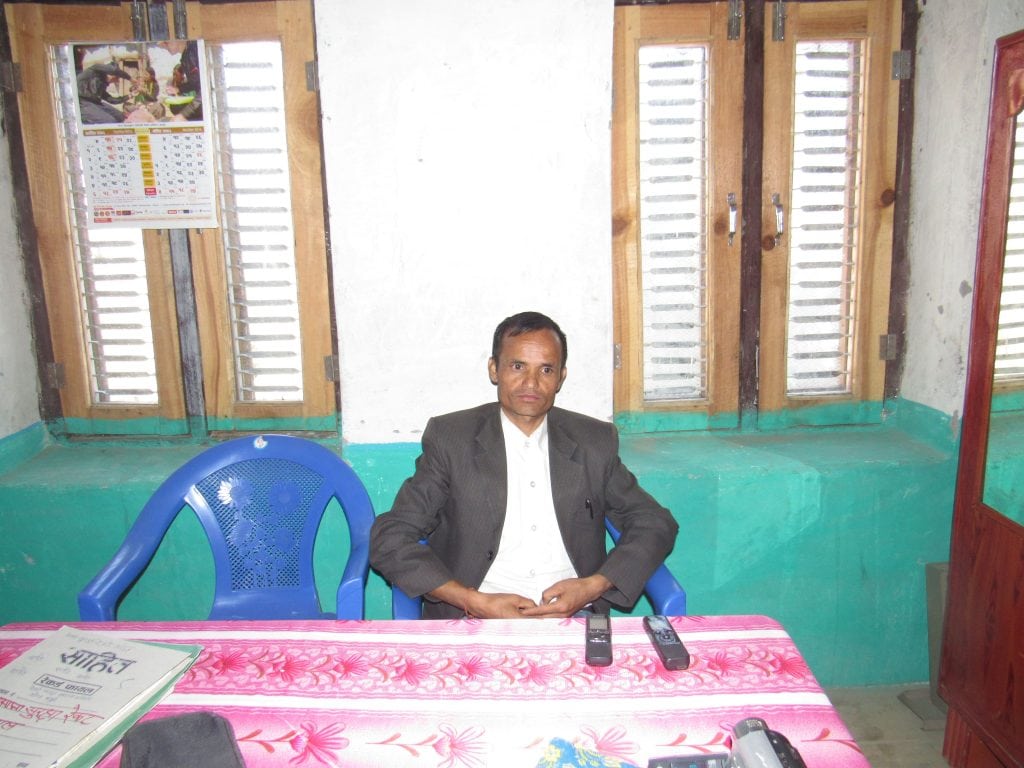 In fact, pregnancy is a sensitive issue. However, there has been a practice of keeping them inside a cowshed with the belief that God would spell curse on them if mothers of new-born babies are kept inside the house. Health-wise, their condition becomes critical with various complications. I have been here for the last two years. They come to health post only if the condition becomes critical. Sometimes, it is hard to save their lives. They are least bothered about health issues, hygiene, and pure drinking water. They prefer to stay inside narrow and filthy cowsheds. There are high chances of the new-born bay being affected by pneumonia.
In fact, pregnancy is a sensitive issue. However, there has been a practice of keeping them inside a cowshed with the belief that God would spell curse on them if mothers of new-born babies are kept inside the house. Health-wise, their condition becomes critical with various complications. I have been here for the last two years. They come to health post only if the condition becomes critical. Sometimes, it is hard to save their lives. They are least bothered about health issues, hygiene, and pure drinking water. They prefer to stay inside narrow and filthy cowsheds. There are high chances of the new-born bay being affected by pneumonia.
Despite various awareness programs, they are not going to give up their age-old practice. These mothers are neither allowed to consume dairy products such as milk, butter, and curd nor are they given meat for a month. I belong to Kalikot and have visited almost all regions of Karnali. Eighty percent of the people still keep mothers in cowsheds for a month in these areas. Even a graduate will prefer keeping his wife in a cowshed during this period. In such a situation, how could we expect change?
Raising new generation in a cowshed
The woman complex within me stimulated my feelings to get into “chhau” custom prevalent widely in mostly Nepal’s western region. With the conviction to explore more, I made up my mind to visit some far-flung villages of Bajura, Humla and Mugu districts.
With much enthusiasm, I set off my journey to the far-western region on October 23, 2017, to get the real picture of the “Chau” tradition (keeping a girl inside a cowshed during menstruation and motherhood). Upon reaching Martadi of Bajura on October 25 by bus, I, along with a local journalist, Prakash Singh, embarked on a 10-day mission to various remote villages, including Bichhya, Rugin, Maila, Madena, Hyanglu, Srikot, and Seri.
The bumpy and muddy road made our journey arduous with a local jeep taking almost four hours to reach Pandusen from where it took more than three hours on foot to reach Kolti. The next day, we started for Baandu.
The journey to Baandu was totally a new experience for us since the only mode of transport was mules laden with stuff. As a journalist, I could smell news about these mules used as a means of transport. However, our major objective was to dig up news related to “chaau” tradition in which women have been bound to stay aloof in cowsheds during maternity. We then started climbing uphill toward Ghim village, the biggest settlement of Baandu, having about 70 households. It was, in fact, a herculean task for us to climb uphill on the rocky trail without enough food and water. Our energy was diminishing. After a strenuous walk, we reached Ghim settlement at 1:30 pm on the 28th of October where we headed straight to health volunteer Ram Devi Malla’s house. After resting a bit, we then headed to meet another volunteer Chandra Kala Buda, who volunteered to take us to the houses, where new mothers were confined within the four walls of cowsheds.
I could hardly control my tears to see the pathetic condition of the cowsheds, mother and the new-born baby, vanishing away my exhaustion, thirst, and hunger. Perhaps, never in my life had I experienced such a pathetic condition when women during the postnatal period are raising their future generation within the four walls of a murky and smutty cowshed littered with hay and dung. The entire scenario, in reality, reminded me of history – the Stone Age.
The slogans of ‘safe motherhood’, ‘regular pregnancy test’ and nutritious diet’, it seemed, have been limited to urban areas. I felt pity but continued to talk to these mothers. Seemed, each one of them were a complete news package to me. I could record their voices emanating grievances on my recorder and simultaneously capture their emotions in my camera. In fact, the voices of these mothers made me emotional. State negligence, social discrimination, poverty, superstition, and what not?
Question arises. Why are these mothers coerced to undergo such a harrowing situation? Imagine a dark room full of filth, insects, dung in one corner, stale rice on a traditional chulo (oven) and a new mother sitting on a pile of hay. I compared with the mothers of the same generation, the same country, and the same citizen, delivering babies in clean hospitals, some in luxury ones, of Kathmandu.
Voices of ‘equal and respectable’ life have been raised quite often. Slogans of women’s rights, including ‘our body, our right’ are regularly raised in the capital and have been observing 16-day campaign against violence against women. Unfortunately, these women seem to be candidly pleasing God by enduring hardship in cowsheds ‘to avert any unfortunate circumstances’ in the family. What a superstition!
I could not control myself by seeing and talking to these young women bearing all hardship in the name of appeasing God. In fact, these women need to realize the fall-outs of these superstitions, about their adolescence, the value of life, health, discrimination, and violence.
Incongruously, the elders’ opinions were more baffling when they categorically stated of fulfilling some ‘formalities’ to shift a new mother in the house. In fact, the houses, which they consider ‘clean’, too, are not free from insects. We could not sleep the whole night due to bugs. Now consider this: If ‘clean’ houses are full of insects, do we need to describe the cowsheds? Perhaps not!
On the 29th, we set off for Rugin drudging on the rocky and narrow path along the steep and barren cliff. Down we could see the Karnali river taking its own course. After a walk of about three hours, we reached Faiti of Rugin where we had an opportunity for a candid chat with Devraj Pandey, a school teacher. Pandey, however, was more disappointed about the distance of health posts rather than a mother confined in a cowshed. “In fact, I thought you were a doctor. My wife is expecting a baby and the due date given by the doctor has exceeded,” he said.
It took seven hours from Faiti to reach Rugin health center. Health workers, who were pre-informed about our visit, were waiting for us. No sooner had we raised the issue of cowsheds, Assistant Health Officer, Dhan Bahadur Phadera said, “This is not only the problem of Bajura. This custom is common in the remote villages of the mid and far-western region.” He informed us that such practices were prevalent in Kalikot, his native village, as well. What more we could ask?
We then went to a cowshed where we met with Saraswoti Budathapa, a mother of a 12-day old baby. At the door of the shed was an axe hanging. “This is to keep away ghosts,” Saraswoti, who was also carrying a sickle in her waist, responded instantly. “Isn’t this a height of superstition?” I queried to myself. Assistant nurse, Prem Kala Malla, who was accompanying us, instantaneously said, “There is a superstitious belief that carrying a sickle will cast away ghosts.”
We then set off for our next destination — Kawadi of Bajura, a center of Mugu, Humla, and Bajura. Down the steep road, we came across a group of people, who were taking rest. I could not resist asking a pregnant woman in the group about her due date. “It’s in December,” she responded shyly. No sooner had I asked whether she too would stay in a cowshed after delivery, the males in the group unanimously said: “custom has to be followed.”
The situation in Maila of Humla was even heartrending. Women, there were least bothered to stay in cowsheds. Family’s happiness was their priority. “We are doing this for our family’s well-being, forget about our sufferings,” they responded. They, in fact, were not prepared to challenge this custom, saying, “I was born in a cowshed and my children too are born here. So, what’s wrong with it?”
In the villages of Humla, there was an absurd belief that pregnant women should be barred from consuming green leaves and nutritious food. Deuche Sarki, a CPN-UML local leader told us, “We tried a lot to create awareness but they are not going to be convinced.”
We asked locals whether they had dairy products such as milk, curd or whey. “No” was the common and straight answer. They said they did not have a cow or a buffalo either. But, in fact, we came to know about the reason after reaching Srikot of Mugu. In fact, they were extremely cautious about not giving any dairy products to Dalits. In Sripur, I had to convince them that among us, two were Brahmins, one Chhetri, and a Thakuri. I had to convince them that I was not menstruating either. They would not give milk to those menstruating and that I kept it a secret to my friends that I was.
Even after returning to Kathmandu from a 22-day tiring visit to the remote villages of the far-west, a question still haunts me: “Till when will women of that region keep on tormenting themselves in the pretext of pleasing God?”



